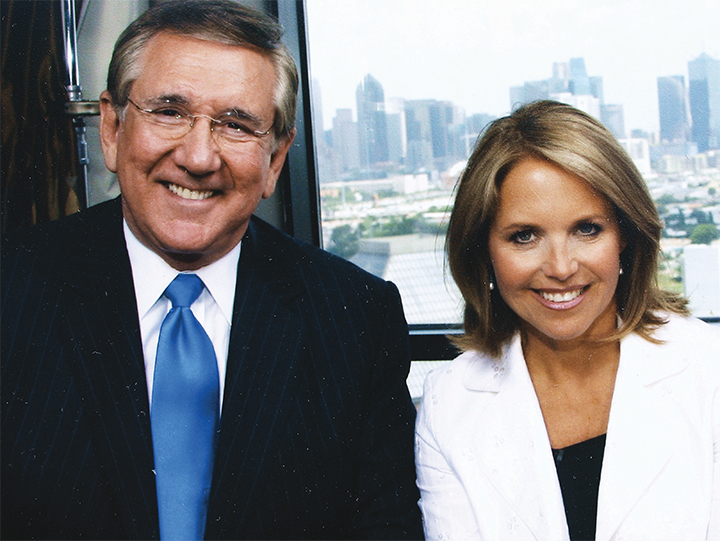
He’s dodged bullets and bombs in Israel, eluded Soviet troops in Lithuania. He’s been wined and dined by Saudi Arabian royals in a desert tent and tossed out of Tiananmen Square by Chinese police, three times. He’s infiltrated the Ku Klux Klan, reported on race riots in Wichita, interviewed just about every U.S. president in living memory — all in a pure news drive to cover the stories of our time.
There have been so many stories,” says Tracy Rowlett ’67/67, anchor and managing editor at CBS’s Dallas affiliate, KTVT. Earlier this year, the veteran broadcaster stepped down from 10 p.m. anchor duties, making more time for family. “It’s been,” he says, “an amazing ride.”
Rowlett’s career is punctuated with more than 100 awards, including two duPont-Columbia awards (considered broadcast journalism’s Pulitzer Prize), one for a team investigative report on the Ku Klux Klan, the other for an in-depth look at capital punishment. In 2006, he was inducted into the prestigious Emmy® Silver Circle.
“I started out as a sports reporter for the Beacon,” Rowlett says in that steady, smooth, somehow reassuring voice of his. He’s just finished a 6 p.m. weeknight newscast and seems in a receptive mood to reminisce. “I went to West High, where an English teacher encouraged me to get involved in journalism.” That teacher’s encouragement, his own knack for writing and interest in sports were what led him to his first professional job at the Wichita newspaper. But print journalism, as it turned out, didn’t capture his long-term attention.
Rowlett attended Wichita’s Friends University, where he played a year of Falcon football before dropping out. He joined the Air Force and was sent to Malmstrom AFB in Montana, where he edited the base newspaper and provided public information about the first Minuteman ICBM squadron, which was activated at Malmstrom in 1961.
“The Minuteman missile was such an important weapon,” he says. “The Washington Post, the New York Times, all the major newspapers and TV stations came to cover developments.”
An even bigger story loomed.
Rowlett next worked for Armed Forces Radio and Television at Wheelus Air Base in Tripoli, Libya. He was on duty in Tripoli when John F. Kennedy was shot in Dallas. For the next three days, Rowlett reported the events concerning the assassination and Kennedy’s funeral. The experience convinced him to make the switch from print to radio and television.
“It’s the impact of broadcast journalism,” he explains as the pivotal reason for his change in focus. “The impact and the immediacy.”
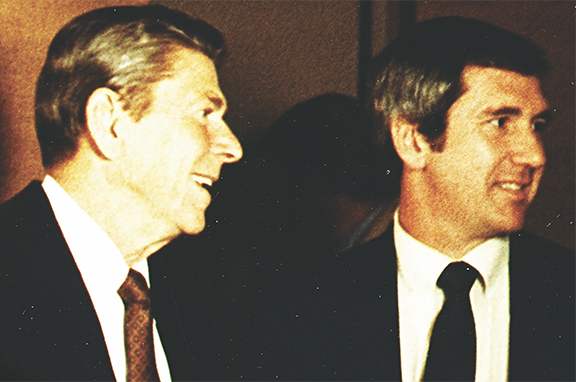
After his discharge, he returned to Wichita, where he studied speech and journalism at WSU and also worked at KFH Radio and for KAKE Radio and Television. Among his WSU broadcast classmates was Johnny Tarrant ’67, who today is co-owner and president of Wichita’s Quik Print.
“At the time, KMUW (the university’s public radio station) was at the corner of 17th and Fairmount,” Tarrant relates. “We spent a lot of time there, and at Manning’s Café, which was nearby. There was a group of us who called ourselves ‘the brotherhood.’ I have no idea why. Judy Enos, now Moler, and Sue Pittman were part of the group. Tracy, Fred Fulks — there were quite a few of us. Because of Tracy’s voice, because he’s on top of what’s happening in the world, we knew he would do well in broadcasting.”
Barry Gaston ’67, who worked at KMUW while a WSU student and then set out on a radio career that took him to Pennsylvania and Ohio and back to Wichita, where he owns Gaston Marketing and hosts KMUW’s Jazz Café and Moonglow with Gaston, worked with Rowlett at KFH.
“He was in the news department and also did some disc jockey chores,” Gaston says. “I was the program director. Tracy was one of those rare individuals who was adaptable to any circumstance — live remotes, news, anything. We could throw him in the air, and he would hit the ground — on his feet.” He pauses, the tone of his voice lifts ever so slightly, and he adds, “He had an odd sense of humor.”
Tarrant, too, mentions his sense of humor, saying simply, “He likes to play tricks on people.” Gaston provides an example: “At KFH, Tracy and I worked on the 10th floor, so we were often in the elevator together. He would stand in a corner and make weird comments that made him sound deranged. He would direct those comments to me, but any people standing between us would exit as quickly as they could. I would be so embarrassed I’d want to slink down the side of the elevator. Tracy has a twisted, strange sense of humor, which, I guess, is necessary in our profession.”
Larry Hatteberg fs ’67, who has become Kansas’ most honored journalist during his 41 years at KAKE, where he now co-anchors KAKE News at Five, relates, “Tracy and I were in a geology class together at WSU. We discovered we weren’t interested in rocks — and we didn’t care. We just didn’t see our future as being set in stones.”
The two non-geologists worked together at KAKE. Hatteberg recalls, “He always had a way about him. He came across as Mr. Everybody. At the same time, he came across with authority.” Rowlett, who particularly liked his political sciences classes at WSU, says it was an exciting time to be in Wichita, both on campus and as a reporter.
“There were many meaningful moments,” he says. “There were race riots in Wichita. And after the WSU plane crash, I went to the hotel where some of the families were. What an emotional experience.”
Former Wichita mayor Bob Knight ’70 says this about his old West High friend: “Tracy’s had an amazing career and succeeded in a dramatic way. He’s a big man in Dallas.” Big enough, in fact, to have a Tracy Rowlett Day, an honor from the Dallas City Council on his 30-year anniversary in Dallas television in 2004.
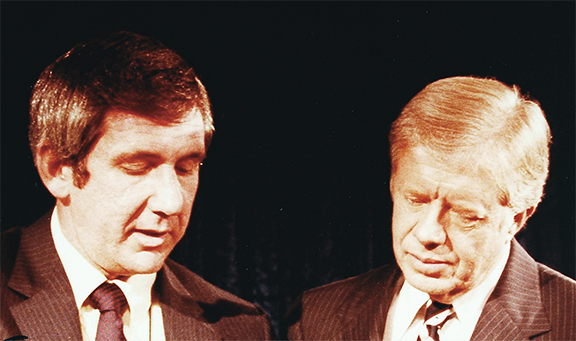
Before his 1974 arrival in Dallas, Rowlett was news director at KMNS in Sioux City, Iowa; state capitol correspondent for KTOK and the Oklahoma News Network in Oklahoma City; and anchor, reporter and managing editor at KWTV, Oklahoma City.
It was at KWTV that Rowlett and two fellow reporters quit in protest after management pulled an investigative series on allegedly crooked auto dealers. The auto dealers were key advertisers.
“Tracy’s concerned about the news,” Hatteberg says. “He’s a pure news guy. He does the news because, like many of us in the business, he knows broadcasting has the power to change lives and to change communities — done right. He does not suffer fools gladly and doesn’t believe in broadcasting as purely an economic tool. The airwaves belong to the people. We understand it’s a business, but we believe in the greater calling.”
After KWTV, Rowlett was hired at WFAA, the ABC affiliate in Dallas. The year before, in 1973, WFAA began a climb to the top that eventually brought it profitability, dominance in the eighth largest market in the nation and a reputation as one of only a handful of stations to reach television “news eminence” — and this from the Columbia Journalism Review.
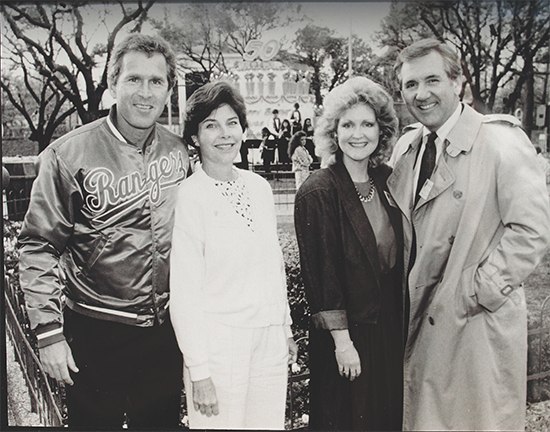
Tracy and Jill Rowlett are pictured with George and
Laura Bush while the four were serving as chairs of
an event for the Children’s Medical Center. The
Rowletts are well known for their service to many
organizations, including the Autism Treatment
Center. Their youngest child, now 21, is autistic.
Rowlett has four children: Dan, David, Carin and
Michael.
Until he left for KTVT in 1999, Rowlett was a reporter and anchor at WFAA. In the mid-’70s, he teamed with Iola Johnson, a young black reporter. They became number one at 10 p.m. Although Johnson moved on and Rowlett has since been paired with numerous other broadcast pros, he remains one of the most popular anchors in the Metroplex. This year, for instance, he was named Best TV Anchor by the Dallas Observer.
Rowlett’s dead-on news sense isn’t limited to how best to deliver the news at 5, 6 or 10. He’s a proven investigative journalist who’s reported on many of the major stories of our day. Here are a few of his adventures:
“I was able to travel in China on several stories,” he says, “and was there not long after the Tiananmen Square massacre. The Chinese had put a firm hand on foreign journalists reporting from the square, and I was escorted out by police, twice, and threatened with arrest if I didn’t stay out of the area. We were able to sneak back in and do some reports, anyway, before being tossed out a third time.
“In Israel — I’ve gone on several assignments there — shots were fired from a Palestinian neighborhood abutting Jerusalem as snipers tried to pick off Israelis in a disputed housing project. Several shots were fired at me, and bullets were hitting at my feet, kicking up dirt, before authorities forced me to vacate my position. I met with members of Hamas and with families of suicide bombers after the Israelis retaliated by blowing up their houses. And I was reporting from a kibbutz near the Egyptian border when bombers hit. It was another narrow miss. And I was in the northern part of Israel, in the Golan, when there were more border skirmishes. We were rushed out of the area just ahead of a bombardment. I developed a keen sense of the bunker mentality shared by many Israelis and others in that very troubled region.
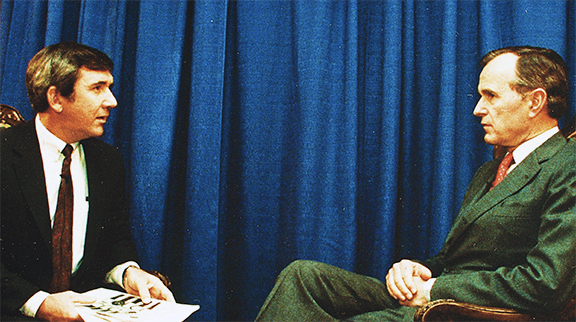
interviewed many U.S. presidents. Counted among
his favorite interview subjects is broadcasting
legend Walter Cronkite.
“I traveled with then Vice President George H.W. Bush on a Middle East mission to Saudi Arabia, Oman, Bahrain, and Yemen. I was able to sit in on some of the meetings that Bush had with leaders of all those countries, including meeting with members of the Saudi Royal family in a tent in the desert. We sat cross-legged and were offered a variety of exotic dishes that included things not normally on the American menu.
“I was traveling in the old Soviet Union and reported from Moscow, Volgograd (Stalingrad) and Leningrad (St. Petersburg), and from the Baltic countries. I was in Riga, Latvia, staying with a Latvian family when the Soviets moved troops into Vilnius in nearby Lithuania. My host risked a long prison term and maybe his life by secretly driving my photographer and me into Vilnius where we were able to gather video and information on Soviet tank and other military actions. Soviet soldiers spotted us and gave chase, but our Latvian driver sped away and lost them. Later that day, his car stopped running. We thought we were in for an international incident since we were not supposed to be in the country. But he managed to get the car started and get us out of the country and back to safety.”
It hasn’t been easy or safe, but Rowlett has met the highest calling of journalism: He’s stood his ground as a witness to the truth, and he’s still on his feet.





